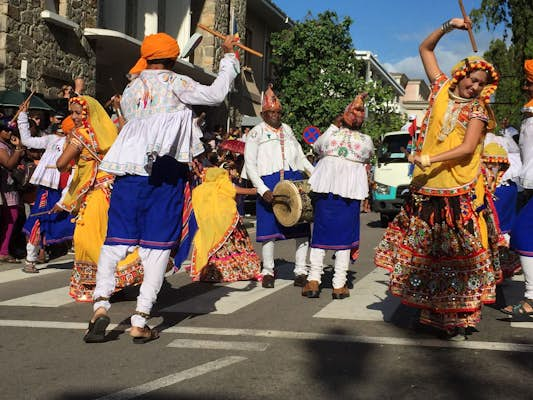Draped on the lower slopes of towering granite mountains, and spilling into the waters of its bustling port, Victoria – the diminutive capital of the Seychelles – certainly has a setting to remember.
But the true reward of spending time in the city of 25,000 Seychellois is the opportunity to witness the diversity of its people, to learn of the nation’s history and to embrace the Creole culture. And given Victoria’s size, this can be achieved in a day trip or two from your beach-side accommodation.

Creole culture on full display during the annual Festival Kreol
For a taste of Creole culture there is no better time to visit Victoria than in late October when the country’s biggest celebration lights up the city. Local cuisine, art, music, theatre and dance are all on full display, and thousands of Seychellois flood in from around the island of Mahé and beyond. The faces of the Seychelles – a mosaic of African, Arab, British, French and Indian heritage – stand together, groove together and smile together. This reaches its climax during the main procession through town, when dozens of clubs and communities from around the country (and elsewhere in Africa) perform and parade along the main streets. The joy and energy of all the participants is as palpable as it is contagious, with the spirit spreading through the crowds.

Shopping, strolling and perusing in Sir Selwyn Selwyn-Clarke Market
With an astounding assortment of seafood on display, you may well smell this covered market – built in 1840 and thoroughly revamped in 1999 – before you step into its colourful confines. However, if octopus, barracuda, parrotfish or other tasty aquatic treats aren’t what you are after, there is plenty of fresh fruit and vegetables to choose from, as well as exotic spices and herbs. Upstairs in the gallery opposite the cafe are several shops selling clothing, souvenirs, artwork and all-important beach kit such as pareos (sarongs). Like the city itself, it’s small compared to others across the continent, which makes it easy to navigate. If you can, time your visit in the early morning when the seafood display is at its apogee, or on Saturday when the whole scene is buzzing.
A taste of the past at Marie-Antoinette
Both the menu and setting of the Marie-Antoinette restaurant speak to the capital city’s past. The building – a majestic wood-and-iron Seychellois mansion from colonial times – is one of the few in the area to maintain its original architecture, and as such it was declared a national monument in 2011. Dining beneath its high ceilings, within its polished wood surrounds, is a step back into the 19th century when it was constructed. Remarkably, Henry Morton Stanley, of ‘Dr Livingstone, I presume’ fame, actually stayed in the house in 1872 on his return from mainland Africa. No less noteworthy are the daily dishes on its traditional set menu, which are a romp through the best of Creole cuisine. Your table is soon filled with plates and bowls full of aubergine fritters, chicken curry, seafood stew, grilled fish, tuna steaks and battered parrotfish. Come hungry.

Religious diversity on display
This island nation is often cited as a model for religious harmony, and it’s not long into your Victoria visit that you grasp the importance and diversity of faith in this small community. The elegant Cathedral of the Immaculate Conception stands prominently over the north side of the town centre, and on Sundays its pews are packed with Catholic worshipers – the rousing hymns flow out its doors and reverberate through its stunning stained-glass windows. The Anglican church may be less historic, but its crisp modern exterior and graceful tower rise proudly in the centre of town. Nearby, and also climbing skyward, is the Sri Navasakthi Vinyagar Temple – its gopuram (entrance tower) is easily the most colourful feature in the capital. On the south side of town, just west of the Inner Harbour, is the Sheikh Mohamed bin Khalifa Mosque.

A fresh look at Victoria’s new National Museum of History
In late 2018 the doors opened to Victoria’s latest attraction – the revamped and relocated National Museum of History. Fittingly, it’s now housed within one of the city’s most impressive historic buildings. Constructed by the Banque Orientale in 1885, it went on to become the site of the Seychelles’ Treasury and Supreme Court, the latter of which operated here until 2013. The upper floor has now been transformed into a space for interesting exhibitions on all aspects of Creole culture, from music and architecture to fishing and clothing. The lower floor walks visitors through 300 years of the islands’ history.

Exploring the wild side of Victoria
In the evenings it’s easy to spot some of the city’s wildlife – look up and you’ll see giant fruit bats flapping slowly across the skies. But for a more immersive experience, walk for ten minutes south of the town centre and into the botanical gardens. Although much of it is manicured, the gardens will surround you with birdsong and allow you to view some of the country’s unique flora and fauna. For instance, the main alley is lined by the famous coco de mer palms, and there is a section of rainforest (home to those bats) and a pen of giant tortoises.
Matt Phillips travelled to the Seychelles with support from the Seychelles Tourism Board. Lonely Planet contributors do not accept freebies in exchange for positive coverage.
https://shop.lonelyplanet.com/products/mauritius-reunions
